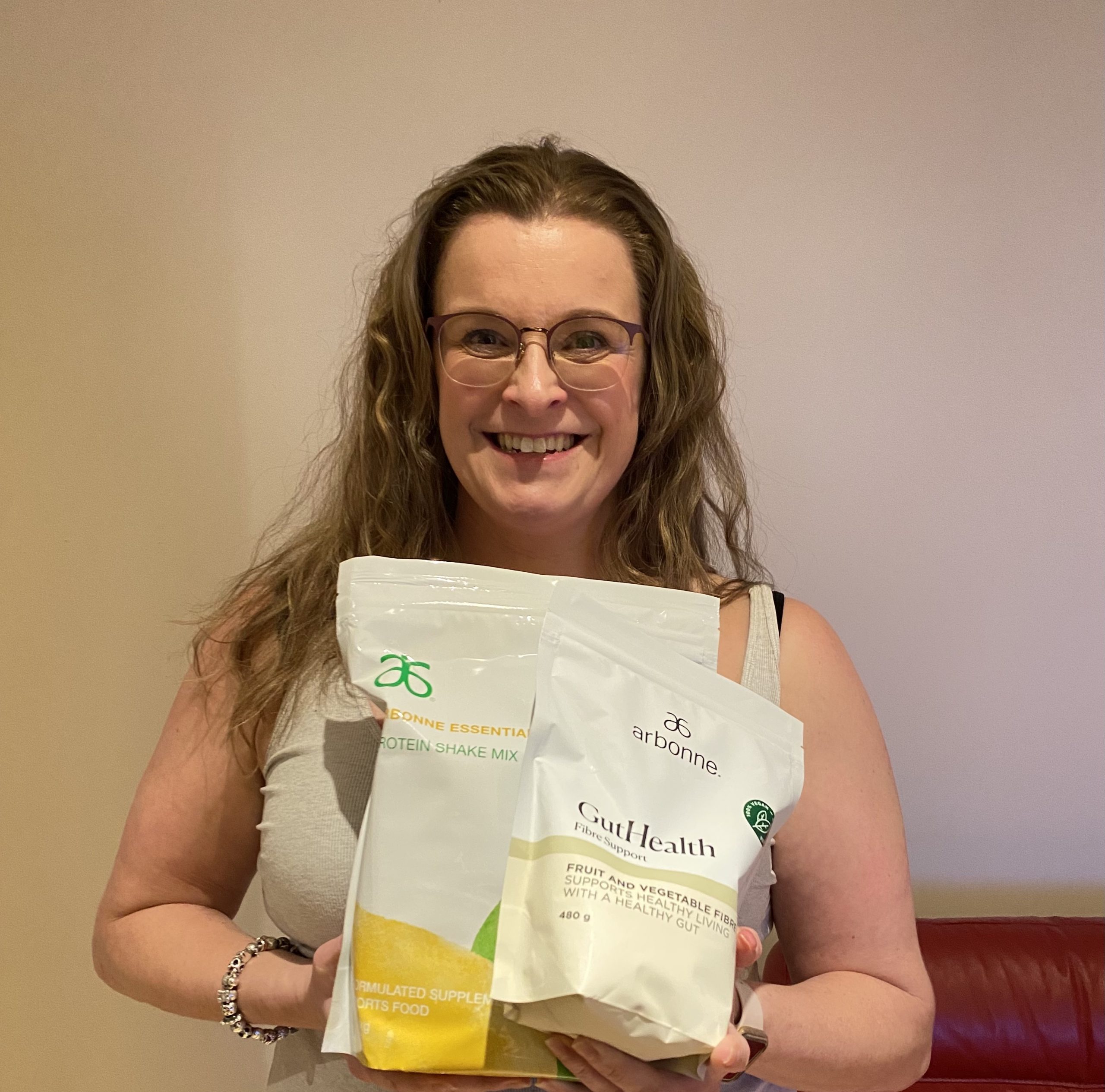As a health and wellness coach, I talk a lot about nutrition with my clients. One topic that comes up frequently is protein – it’s crucial for muscle repair, satiety, energy, and so much more! Many people turn to protein powders for a convenient boost, often defaulting to whey or casein, which are derived from dairy.
But what about vegan protein powders? Often, people assume these are only for those following a strict vegan or plant-based diet. Today, I want to challenge that assumption and share why incorporating a high-quality vegan protein powder, like the ones we love from Arbonne, can be a fantastic choice for anyone, regardless of your dietary preferences.
Here’s why you might want to give vegan protein a try:
1. Easier on the Digestive System
Have you ever felt bloated or uncomfortable after a whey protein shake? You’re not alone. Dairy-based proteins contain lactose, which many people have difficulty digesting (even if they aren’t fully lactose intolerant). Vegan protein powders, typically derived from sources like peas, brown rice, cranberry, or pumpkin seeds, are naturally lactose-free. This often makes them gentler on the stomach and easier to digest for a wider range of people [1]. If digestive comfort is a priority for you, switching to or incorporating a vegan protein could make a noticeable difference.
2. Avoiding Common Allergens & Sensitivities
Dairy is one of the most common food allergens [2]. Even if you don’t have a diagnosed allergy, you might have a sensitivity that causes subtle inflammation or discomfort. Vegan protein powders offer a great way to supplement your protein intake while avoiding dairy altogether. Many are also free from other common allergens like soy and gluten (always check the label!), making them a safe harbour for many individuals seeking clean supplementation.
3. Diverse Nutrient Profile
Vegan protein powders aren’t just about protein. Because they come from plants, they often bring along other beneficial nutrients. Depending on the source ingredients, you might get a bonus of fibre, vitamins, minerals, and even some healthy fats [3]. For example, pea protein is rich in iron, while powders containing seeds like chia or flax add fibre and omega-3 fatty acids. This contrasts with highly processed whey isolates, which are primarily just protein. Choosing a vegan blend can contribute more broadly to your overall nutrient intake.
4. High-Quality, Complete Protein Source
A common myth is that plant proteins are “incomplete.” While individual plant sources might be lower in one or more essential amino acids, high-quality vegan protein powders overcome this by blending different plant sources. For instance, combining pea protein (rich in lysine) with brown rice protein (rich in methionine) creates a powder with a complete amino acid profile, comparable to animal proteins, providing all the building blocks your body needs for muscle building and repair [4, 5]. Arbonne’s protein, for example, is specifically formulated with a blend of pea, cranberry, and rice protein to deliver a full profile of essential amino acids.
5. Environmental Considerations
While maybe not your primary driver, it’s worth noting that plant-based proteins generally have a lower environmental footprint compared to animal-derived proteins, requiring less water and land resources and producing fewer greenhouse gas emissions [6]. Choosing plant-based options more often, even just for your protein supplement, is a small way to contribute to a more sustainable food system.
Making the Switch (or Adding it In!)
You don’t need to overhaul your entire diet to reap the benefits of vegan protein. Simply swapping your usual post-workout shake or adding a scoop to your morning smoothie can be a great way to experience the advantages.
Look for powders with:
- A blend of plant sources for a complete amino acid profile.
- Clean ingredients, free from excessive fillers or artificial sweeteners.
- Third-party certifications for quality and purity, if possible.
Vegan protein powder isn’t just a niche product anymore. It’s a versatile, effective, and often gentler way for anyone to meet their protein goals while potentially gaining extra nutrients and avoiding common digestive issues.
Ready to explore the benefits yourself? Let’s chat about finding the right protein supplement to support your unique health and wellness journey!
References:
[1] Hertzler, S. R., Lieblein-Boff, J. C., Weiler, M., & Allgeier, C. (2020). Plant Proteins: Assessing Their Nutritional Quality and Effects on Health and Physical Function. Nutrients, 12(12), 3704. https://doi.org/10.3390/nu12123704(Discusses digestibility and quality of plant proteins)
[2] Sicherer, S. H., & Sampson, H. A. (2018). Food allergy: A review and update on epidemiology, pathogenesis, diagnosis, prevention, and management. Journal of Allergy and Clinical Immunology, 141(1), 41–58.https://doi.org/10.1016/j.jaci.2017.11.003 (Covers common food allergens, including milk)
[3] Lynch, H., Johnston, C., & Wharton, C. (2018). Plant-Based Diets: Considerations for Environmental Impact, Protein Quality, and Exercise Performance. Nutrients, 10(12), 1841. https://doi.org/10.3390/nu10121841 (Touches upon nutrient profiles of plant-based sources)
[4] Gorissen, S. H. M., Crombag, J. J. R., Senden, J. M. G., Waterval, W. A. H., Bierau, J., Verdijk, L. B., & van Loon, L. J. C. (2018). Protein content and amino acid composition of commercially available plant-based protein isolates.Amino Acids, 50(12), 1685–1695. https://doi.org/10.1007/s00726-018-2640-5 (Details amino acid profiles of various plant proteins)
[5] Banaszek, A., Townsend, J. R., Bender, D., Vantrease, W. C., Marshall, A. C., & Johnson, K. D. (2019). The Effects of Whey vs. Pea Protein on Physical Adaptations Following 8-Weeks of High-Intensity Functional Training (HIFT): A Pilot Study. Sports (Basel, Switzerland), 7(1), 12. https://doi.org/10.3390/sports7010012 (Compares effects of whey vs. pea protein on muscle adaptations, finding similar results)
[6] Poore, J., & Nemecek, T. (2018). Reducing food’s environmental impacts through producers and consumers. Science, 360(6392), 987–992. https://doi.org/10.1126/science.aaq0216 (Comprehensive study on the environmental impacts of different food products)
Disclaimer: This blog post is for informational purposes only and does not constitute medical advice. Always consult with a healthcare professional or registered dietitian before making significant changes to your diet or supplement routine.



